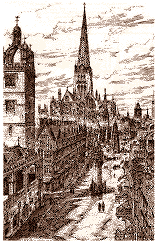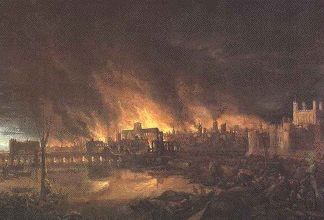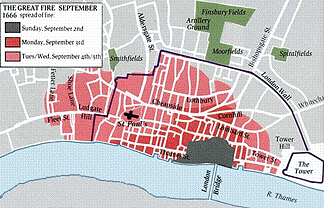September 2: Religion and the Great Fire of London
The Great Fire of London (1666) and the Hand of God
It was on this date, September 2, 1666, that the Great Fire of London, which destroyed 4/5 of the medieval city that had just the year before been visited by the Plague, started on a Sunday in the royal baker's shop on Pudding Lane, near London Bridge. Riverfront warehouses holding oil, tallow, and other combustible goods were soon ignited. In his diary, Samuel Pepys recorded seeing the blaze from the Tower of London, and noted that even the King helped the citizens to put it out.
Before the fire of London burned out on Thursday, some five days later, it destroyed 13,200 houses, 87 parish churches, 6 chapels, 44 Company Halls, the Royal Exchange, the Custom House, St Paul's Cathedral, the Guildhall, the Bridewell and other City prisons, the Session House, four bridges across the Thames and Fleet rivers, and three city gates.
It wasn't as if London hadn't been warned, and no psychic powers were necessary. Fires in London were common. Construction of homes and shops was principally wood, thatch and pitch. In April 1665, King Charles II had warned the Lord Mayor of London* of the danger inherent in the narrow streets and overhanging timber houses. The heat of a dry summer had depleted London water reserves. All it took was inattentiveness to a baker's fire that Thomas Farynor had believed extinguished the night before.
English astrologer William Lilly on 25 October 1666, was ordered to appear in the Speaker's Chamber of the House of Commons because he was said to have predicted the fire fourteen years before – so naturally it was assumed he had started it! Not having the courage of his predictions, Lilly persuaded the committee that his forecast had not been precise. He was allowed to go. The year 1666, in Roman numerals, is written MDCLXVI – all declining numbers — and for that reason it was interpreted that the fire signaled the beginning of the end of the world!
It didn't matter: no prediction of the fire was interpreted in time to prevent the conflagration. A Parliamentary committee reported in January 1667 that "nothing hath yet been found to argue it to have been other than the hand of God upon us, a great wind, and the season so very dry."
But was it God's will that people lived in unsanitary, tightly closed conditions? Was it God's will that 87 churches and six chapels burned? Was it God's will that mobs blamed anyone foreign-looking or speaking with an accent? Did only sinners live in London north of the Thames, and none in Southark, which was spared fire only because London Bridge collapsed? Was it a miracle that although one sixth of London's 600,000 population became homeless, only 16 people perished? And if the fire had been arson, would we gather in groups and sing hymns of praise to the arsonist? Of course not. So why does God get praise for doing something that would land a mere human in jail?
If there was an upside to the single greatest catastrophe in the history of London, it was atonement for the sin of sloppy sanitation: the fire killed many of the rats responsible for spreading Plague germs. In an age when the only defense again disease was incantation, rather than cleanliness and waste treatment; when in five days a fire could rip through more than 430 acres – a population density of 232 human beings per acre – with no municipal fire company, it seems God might have suggested preparation rather than prayer!
* The Lord Mayor of London, Sir Thomas Bloodworth, on being awakened with the news, was unimpressed, declaring that "A woman might piss it out."
Originally published September 2003 by Ronald Bruce Meyer.




